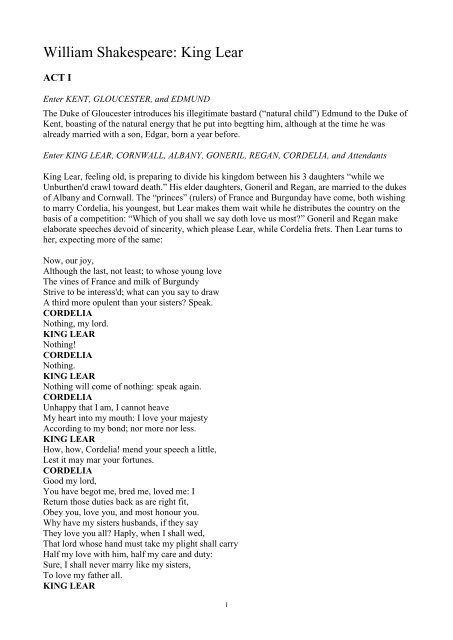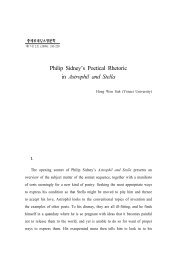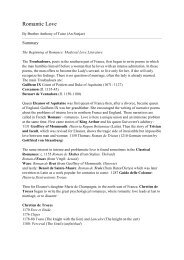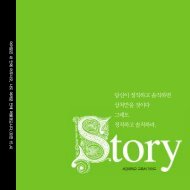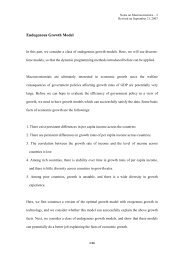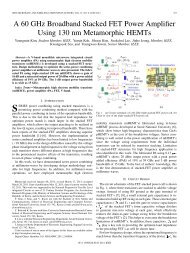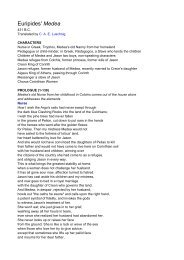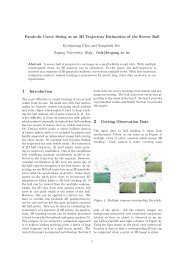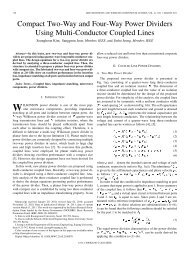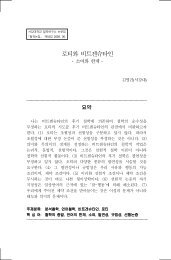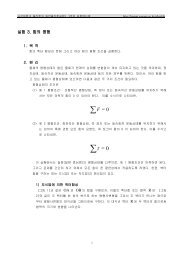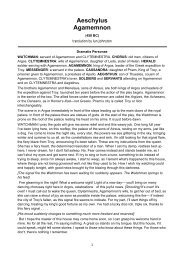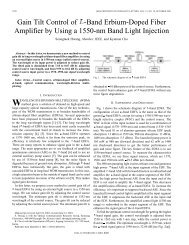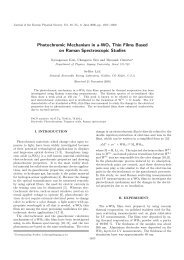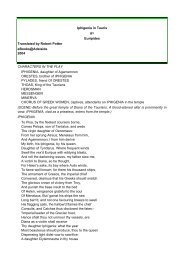William Shakespeare: King Lear
William Shakespeare: King Lear
William Shakespeare: King Lear
Create successful ePaper yourself
Turn your PDF publications into a flip-book with our unique Google optimized e-Paper software.
<strong>William</strong> <strong>Shakespeare</strong>: <strong>King</strong> <strong>Lear</strong>ACT IEnter KENT, GLOUCESTER, and EDMUNDThe Duke of Gloucester introduces his illegitimate bastard (“natural child”) Edmund to the Duke ofKent, boasting of the natural energy that he put into begtting him, although at the time he wasalready married with a son, Edgar, born a year before.Enter KING LEAR, CORNWALL, ALBANY, GONERIL, REGAN, CORDELIA, and Attendants<strong>King</strong> <strong>Lear</strong>, feeling old, is preparing to divide his kingdom between his 3 daughters “while weUnburthen'd crawl toward death.” His elder daughters, Goneril and Regan, are married to the dukesof Albany and Cornwall. The “princes” (rulers) of France and Burgunday have come, both wishingto marry Cordelia, his youngest, but <strong>Lear</strong> makes them wait while he distributes the country on thebasis of a competition: “Which of you shall we say doth love us most?” Goneril and Regan makeelaborate speeches devoid of sincerity, which please <strong>Lear</strong>, while Cordelia frets. Then <strong>Lear</strong> turns toher, expecting more of the same:Now, our joy,Although the last, not least; to whose young loveThe vines of France and milk of BurgundyStrive to be interess'd; what can you say to drawA third more opulent than your sisters? Speak.CORDELIANothing, my lord.KING LEARNothing!CORDELIANothing.KING LEARNothing will come of nothing: speak again.CORDELIAUnhappy that I am, I cannot heaveMy heart into my mouth: I love your majestyAccording to my bond; nor more nor less.KING LEARHow, how, Cordelia! mend your speech a little,Lest it may mar your fortunes.CORDELIAGood my lord,You have begot me, bred me, loved me: IReturn those duties back as are right fit,Obey you, love you, and most honour you.Why have my sisters husbands, if they sayThey love you all? Haply, when I shall wed,That lord whose hand must take my plight shall carryHalf my love with him, half my care and duty:Sure, I shall never marry like my sisters,To love my father all.KING LEAR1
But goes thy heart with this?CORDELIAAy, good my lord.KING LEARSo young, and so untender?CORDELIASo young, my lord, and true.KING LEARLet it be so; thy truth, then, be thy dower:For, by the sacred radiance of the sun,The mysteries of Hecate, and the night;By all the operation of the orbsFrom whom we do exist, and cease to be;Here I disclaim all my paternal care,Propinquity and property of blood,And as a stranger to my heart and meHold thee, from this, for ever. The barbarous Scythian,Or he that makes his generation messesTo gorge his appetite, shall to my bosomBe as well neighbour'd, pitied, and relieved,As thou my sometime daughter.Instead, he divides the nation between Cornwall and Albany (men dispose of their wives’ estates),and says he will stay with each in turn, one month at a time, accompanied by a retinue of 100knights. Kent protests: “Thy youngest daughter does not love thee least” and <strong>Lear</strong> in furyimmediately banishes him. Kent expresses his support for Cordelia, his scepticism as to the “love”of the two other daughters, and leaves.Burgundy, learning that Cordelia has been disinherited and has no dowry or lands, is nolonger interested in marrying her. France is different: “Fairest Cordelia, that art most rich, beingpoor; Most choice, forsaken; and most loved, despised! Thee and thy virtues here I seize upon.” Asshe is leaving, Cordelia foresees what will happen, and urges her sisters to be kind to their father buther sisters scorn her. As soon as she has left, Goneril and Regan start to complain about theirfather’s erratic behavior:Enter EDMUND, with a letter (preparing to deceive his father, Gloucester)EDMUNDThou, nature, art my goddess; to thy lawMy services are bound. Wherefore should IStand in the plague of custom, and permitThe curiosity of nations to deprive me,For that I am some twelve or fourteen moon-shinesLag of a brother? Why bastard? wherefore base?When my dimensions are as well compact,My mind as generous, and my shape as true,As honest madam's issue? Why brand they usWith base? with baseness? bastardy? base, base?Who, in the lusty stealth of nature, takeMore composition and fierce qualityThan doth, within a dull, stale, tired bed,Go to the creating a whole tribe of fops,Got 'tween asleep and wake? Well, then,Legitimate Edgar, I must have your land:2
Our father's love is to the bastard EdmundAs to the legitimate: fine word,--legitimate!Well, my legitimate, if this letter speed,And my invention thrive, Edmund the baseShall top the legitimate. I grow; I prosper:Now, gods, stand up for bastards!Enter GLOUCESTER. Edmund shows him a (forged) letter where Edgar seems to say that theyshould kill their father and share his land. Edmund manipulates his father, pretending to be shocked.Gloucester sees a cosmic pattern of growing discord which Edmund then mocks.Edgar comes in, Edmund tell him that their father is very angry with him, that he should hide(which will prevent Edgar from telling Gloucester that the letter is a forgery, of course). Edmundadmires his own skill in deceiving:A credulous father! and a brother noble,Whose nature is so far from doing harms,That he suspects none: on whose foolish honestyMy practises ride easy! I see the business.Let me, if not by birth, have lands by wit:All with me's meet that I can fashion fit.Time has passed, <strong>Lear</strong> is staying with Goneril, who is complaining about the way he still acts asthough he had power and spending his time enjoying himself with his 100 knights. She tells hersteward Oswald to ignore <strong>Lear</strong>’s orders and treat the knights badly. “If he dislike it, let him to oursister, Whose mind and mine, I know, in that are one, Not to be over-ruled. Idle old man, that stillwould manage those authorities that he hath given away!Enter KENT, disguised. Kent is resolved to stay close to <strong>Lear</strong>, as a loyal servant, to protect him andhas disguised himself as a poor serf, speaking roughly. <strong>Lear</strong> likes him. When <strong>Lear</strong> gives orders toOswald, he is ignored, Goneril refuses to come when he summons her. Oswald is rude to <strong>Lear</strong>, Kentpunishes him. Enter Fool. The Fool, we know, has been upset by Cordelia’s rejection and departure.He is authorized to comment frankly on <strong>Lear</strong>’s actions in joking. The theme “Nothing” returns:KENTThis is nothing, fool.FoolThen 'tis like the breath of an unfee'd lawyer; you gave me nothing for't. Can you make no use ofnothing, nuncle?KING LEARWhy, no, boy; nothing can be made out of nothing.Fool[To KENT] Prithee, tell him, so much the rent of his land comes to: he will not believe a fool.Prithee, nuncle, keep a schoolmaster that can teachthy fool to lie: I would fain learn to lie.KING LEARAn you lie, sirrah, we'll have you whipped.FoolI marvel what kin thou and thy daughters are: they'll have me whipped for speaking true, thou'lthave me whipped for lying; and sometimes I am whipped for holding my peace. I had rather be anykind o' thing than a fool: and yet I would not be thee, nuncle; thou hast pared thy wit o' both sides,and left nothing i' the middle: here comes one o' the parings.3
Enter GONERILKING LEARHow now, daughter! what makes that frontlet on?Methinks you are too much of late i' the frown.FoolThou wast a pretty fellow when thou hadst no need to care for her frowning; now thou art an Owithout a figure: I am better than thou art now; I am a fool, thou art nothing.Goneril reproaches <strong>Lear</strong>, who is shocked to realize that she does not respect him.KING LEARDoth any here know me? This is not <strong>Lear</strong>:Doth <strong>Lear</strong> walk thus? speak thus? Where are his eyes?Either his notion weakens, his discerningsAre lethargied--Ha! waking? 'tis not so.Who is it that can tell me who I am?When she asks him to reduce the number of his retinue, he grows angry and says he will leave herhouse and go to Regan.KING LEARDarkness and devils!Saddle my horses; call my train together:Degenerate bastard! I'll not trouble thee.Yet have I left a daughter.GONERILYou strike my people; and your disorder'd rabbleMake servants of their betters.KING LEARWoe, that too late repents,--Enter ALBANYO, sir, are you come?Is it your will? Speak, sir. Prepare my horses.Ingratitude, thou marble-hearted fiend,More hideous when thou show'st thee in a childThan the sea-monster!ALBANYPray, sir, be patient.KING LEAR[To GONERIL] Detested kite! thou liest.My train are men of choice and rarest parts,That all particulars of duty know,And in the most exact regard supportThe worships of their name. O most small fault,How ugly didst thou in Cordelia show!That, like an engine, wrench'd my frame of natureFrom the fix'd place; drew from heart all love,4
And added to the gall. O <strong>Lear</strong>, <strong>Lear</strong>, <strong>Lear</strong>!Beat at this gate, that let thy folly in, Striking his headAnd thy dear judgment out! Go, go, my people.ALBANYMy lord, I am guiltless, as I am ignorantOf what hath moved you.KING LEARIt may be so, my lord.Hear, nature, hear; dear goddess, hear!Suspend thy purpose, if thou didst intendTo make this creature fruitful!Into her womb convey sterility!Dry up in her the organs of increase;And from her derogate body never springA babe to honour her! If she must teem,Create her child of spleen; that it may live,And be a thwart disnatured torment to her!Let it stamp wrinkles in her brow of youth;With cadent tears fret channels in her cheeks;Turn all her mother's pains and benefitsTo laughter and contempt; that she may feelHow sharper than a serpent's tooth it isTo have a thankless child! Away, away!Exit.Re-enter KING LEAR: “What, fifty of my followers at a clap! Within a fortnight!” (Not explained,apparently his retinue has been reduced)To GONERIL (<strong>Lear</strong> begins to lose control of his feelings, weeps)KING LEARLife and death! I am ashamedThat thou hast power to shake my manhood thus;That these hot tears, which break from me perforce,Should make thee worth them. Blasts and fogs upon thee!The untented woundings of a father's cursePierce every sense about thee! Old fond eyes,Beweep this cause again, I'll pluck ye out,And cast you, with the waters that you lose,To temper clay. Yea, it is come to this?Let is be so: yet have I left a daughter,Who, I am sure, is kind and comfortable:When she shall hear this of thee, with her nailsShe'll flay thy wolvish visage. Thou shalt findThat I'll resume the shape which thou dost thinkI have cast off for ever: thou shalt,I warrant thee.Exeunt KING LEAR, KENT, and Attendants5
OSWALD is to take a letter to Regan warning her of what has happened. (We begin to sense thatGoneril despises her kind-hearted husband.)SCENE V. Court before the same.Enter KING LEAR, KENT, and Fool <strong>Lear</strong> sends the disguised Kent to prepare Regan for his coming(she seems to be living in Gloucester or near Gloucester’s house)FoolShalt see thy other daughter will use thee kindly; for though she's as like this as a crab's like anapple, yet I can tell what I can tell.KING LEARWhy, what canst thou tell, my boy?FoolShe will taste as like this as a crab does to a crab. Thou canst tell why one's nose stands i' the middleon's face?KING LEARNo.FoolWhy, to keep one's eyes of either side's nose; that what a man cannot smell out, he may spy into.KING LEARI did her wrong--FoolCanst tell how an oyster makes his shell?KING LEARNo.FoolNor I neither; but I can tell why a snail has a house.KING LEARWhy?FoolWhy, to put his head in; not to give it away to his daughters, and leave his horns without a case.KING LEARI will forget my nature. So kind a father! Be my horses ready?FoolThy asses are gone about 'em. The reason why the seven stars are no more than seven is a prettyreason.KING LEARBecause they are not eight?FoolYes, indeed: thou wouldst make a good fool.KING LEARTo take 't again perforce! Monster ingratitude!FoolIf thou wert my fool, nuncle, I'ld have thee beaten for being old before thy time.KING LEARHow's that?FoolThou shouldst not have been old till thou hadst been wise.KING LEARO, let me not be mad, not mad, sweet heavenKeep me in temper: I would not be mad!6
ExeuntACT IISCENE I. GLOUCESTER's castle.Enter EDMUND <strong>Lear</strong>ning that the Duke of Cornwall (the effective king of the area) is coming, hemoves to get rid of Edgar, telling him that his life is in danger. Then he cuts his own arm and saysthat Edgar tried to kill him, and wants to kill Gloucester. Gloucester believes his lies.All ports I'll bar; the villain shall not 'scape;The duke must grant me that: besides, his pictureI will send far and near, that all the kingdomMay have the due note of him; and of my land,Loyal and natural boy, I'll work the meansTo make thee capable.Enter CORNWALL, REGAN, and Attendants They have already heard about Edgar. Regan twiststhe affair to link it with <strong>Lear</strong> and his knights, as though her life is in danger from them:REGANWhat, did my father's godson seek your life?He whom my father named? your Edgar?GLOUCESTERO, lady, lady, shame would have it hid!REGANWas he not companion with the riotous knightsThat tend upon my father?GLOUCESTERI know not, madam: 'tis too bad, too bad.EDMUNDYes, madam, he was of that consort.REGANNo marvel, then, though he were ill affected:'Tis they have put him on the old man's death,To have the expense and waste of his revenues.Regan and Cornwall have come to Gloucester’s house to avoid admitting <strong>Lear</strong> to their own home.SCENE II. Before Gloucester's castle.Enter KENT and OSWALD, separately. Kent recognizes Oswald and attakcs him (symbolic conflictbetween servants from the two sides of the moral equation)Enter EDMUND, with his rapier drawn, CORNWALL, REGAN, GLOUCESTER, and Servants.After a lengthy exchange, in which Kent is identified as <strong>Lear</strong>’s servant, Cornwall decides to put himin the stocks, a shaming punishment. Gloucester is unhappy at this but can do nothing. Kent, leftalone, produces a letter he has received from Cordelia.SCENE III. A wood.7
Enter EDGAR In order to disguise himself, he decides to become a mad beggar.EDGARI will preserve myself: and am bethoughtTo take the basest and most poorest shapeThat ever penury, in contempt of man,Brought near to beast: my face I'll grime with filth;Blanket my loins: elf all my hair in knots;And with presented nakedness out-faceThe winds and persecutions of the sky.The country gives me proof and precedentOf Bedlam beggars, who, with roaring voices,Strike in their numb'd and mortified bare armsPins, wooden pricks, nails, sprigs of rosemary;And with this horrible object, from low farms,Poor pelting villages, sheep-cotes, and mills,Sometime with lunatic bans, sometime with prayers,Enforce their charity. Poor Turlygod! poor Tom!That's something yet: Edgar I nothing am.ExitSCENE IV. Before GLOUCESTER's castle. KENT in the stocks.Enter KING LEAR, Fool, and Gentleman They have been to Regan’s home and not found her, sothey have come to Gloucester’s. <strong>Lear</strong> finds Kent in the stocks, despite his status as the <strong>King</strong>’sservant. <strong>Lear</strong> is horrified.FoolWinter's not gone yet, if the wild-geese fly that way.Fathers that wear ragsDo make their children blind;But fathers that bear bagsShall see their children kind.Fortune, that arrant whore,Ne'er turns the key to the poor.But, for all this, thou shalt have as many doloursfor thy daughters as thou canst tell in a year.KING LEARO, how this mother swells up toward my heart!Hysterica passio, down, thou climbing sorrow,Thy element's below! Where is this daughter?KENTWith the earl, sir, here within.KING LEARFollow me not;Stay here.ExitRe-enter KING LEAR with GLOUCESTER8
KING LEARDeny to speak with me? They are sick? they are weary?They have travell'd all the night? Mere fetches;The images of revolt and flying off.Fetch me a better answer.GLOUCESTERMy dear lord,You know the fiery quality of the duke;How unremoveable and fix'd he isIn his own course.KING LEARVengeance! plague! death! confusion!Fiery? what quality? Why, Gloucester, Gloucester,I'ld speak with the Duke of Cornwall and his wife.GLOUCESTERWell, my good lord, I have inform'd them so.KING LEARInform'd them! Dost thou understand me, man?GLOUCESTERAy, my good lord.KING LEARThe king would speak with Cornwall; the dear fatherWould with his daughter speak, commands her service:Are they inform'd of this? My breath and blood!Fiery? the fiery duke? Tell the hot duke that--No, but not yet: may be he is not well:Infirmity doth still neglect all officeWhereto our health is bound; we are not ourselvesWhen nature, being oppress'd, commands the mindTo suffer with the body: I'll forbear;And am fall'n out with my more headier will,To take the indisposed and sickly fitFor the sound man. Death on my state! whereforeLooking on KENTShould he sit here? This act persuades meThat this remotion of the duke and herIs practise only. Give me my servant forth.Go tell the duke and 's wife I'ld speak with them,Now, presently: bid them come forth and hear me,Or at their chamber-door I'll beat the drumTill it cry sleep to death.GLOUCESTERI would have all well betwixt you.ExitKING LEARO me, my heart, my rising heart! but, down!9
Enter CORNWALL, REGAN, GLOUCESTER, and ServantsKING LEARGood morrow to you both.CORNWALLHail to your grace!KENT is set at libertyREGANI am glad to see your highness.KING LEARRegan, I think you are; I know what reasonI have to think so: if thou shouldst not be glad,I would divorce me from thy mother's tomb,Sepulchring an adultress.To KENTO, are you free?Some other time for that. Beloved Regan,Thy sister's naught: O Regan, she hath tiedSharp-tooth'd unkindness, like a vulture, here:Points to his heartI can scarce speak to thee; thou'lt not believeWith how depraved a quality--O Regan!REGANI pray you, sir, take patience: I have hope.You less know how to value her desertThan she to scant her duty.KING LEARSay, how is that?REGANI cannot think my sister in the leastWould fail her obligation: if, sir, perchanceShe have restrain'd the riots of your followers,'Tis on such ground, and to such wholesome end,As clears her from all blame.KING LEARMy curses on her!REGANO, sir, you are old.Nature in you stands on the very vergeOf her confine: you should be ruled and ledBy some discretion, that discerns your stateBetter than you yourself. Therefore, I pray you,That to our sister you do make return;Say you have wrong'd her, sir.KING LEAR10
Ask her forgiveness?Do you but mark how this becomes the house:'Dear daughter, I confess that I am old;KneelingAge is unnecessary: on my knees I begThat you'll vouchsafe me raiment, bed, and food.'REGANGood sir, no more; these are unsightly tricks:Return you to my sister.KING LEAR[Rising] Never, Regan:She hath abated me of half my train;Look'd black upon me; struck me with her tongue,Most serpent-like, upon the very heart:All the stored vengeances of heaven fallOn her ingrateful top! Strike her young bones,You taking airs, with lameness!CORNWALLFie, sir, fie!KING LEARYou nimble lightnings, dart your blinding flamesInto her scornful eyes! Infect her beauty,You fen-suck'd fogs, drawn by the powerful sun,To fall and blast her pride!REGANO the blest gods! so will you wish on me,When the rash mood is on.KING LEARNo, Regan, thou shalt never have my curse:Thy tender-hefted nature shall not giveThee o'er to harshness: her eyes are fierce; but thineDo comfort and not burn. 'Tis not in theeTo grudge my pleasures, to cut off my train,To bandy hasty words, to scant my sizes,And in conclusion to oppose the boltAgainst my coming in: thou better know'stThe offices of nature, bond of childhood,Effects of courtesy, dues of gratitude;Thy half o' the kingdom hast thou not forgot,Wherein I thee endow'd.REGANGood sir, to the purpose.KING LEARWho put my man i' the stocks?Tucket withinCORNWALLWhat trumpet's that?REGAN11
I know't, my sister's: this approves her letter,That she would soon be here.Enter OSWALDIs your lady come?KING LEARThis is a slave, whose easy-borrow'd prideDwells in the fickle grace of her he follows.Out, varlet, from my sight!CORNWALLWhat means your grace?KING LEARWho stock'd my servant? Regan, I have good hopeThou didst not know on't. Who comes here? O heavens,Enter GONERILIf you do love old men, if your sweet swayAllow obedience, if yourselves are old,Make it your cause; send down, and take my part!To GONERILArt not ashamed to look upon this beard?O Regan, wilt thou take her by the hand?GONERILWhy not by the hand, sir? How have I offended?All's not offence that indiscretion findsAnd dotage terms so.KING LEARO sides, you are too tough;Will you yet hold? How came my man i' the stocks?CORNWALLI set him there, sir: but his own disordersDeserved much less advancement.KING LEARYou! did you?REGANI pray you, father, being weak, seem so.If, till the expiration of your month,You will return and sojourn with my sister,Dismissing half your train, come then to me:I am now from home, and out of that provisionWhich shall be needful for your entertainment.KING LEARReturn to her, and fifty men dismiss'd?No, rather I abjure all roofs, and chooseTo wage against the enmity o' the air;To be a comrade with the wolf and owl,--Necessity's sharp pinch! Return with her?Why, the hot-blooded France, that dowerless took12
Our youngest born, I could as well be broughtTo knee his throne, and, squire-like; pension begTo keep base life afoot. Return with her?Persuade me rather to be slave and sumpterTo this detested groom.Pointing at OSWALDGONERILAt your choice, sir.KING LEARI prithee, daughter, do not make me mad:I will not trouble thee, my child; farewell:We'll no more meet, no more see one another:But yet thou art my flesh, my blood, my daughter;Or rather a disease that's in my flesh,Which I must needs call mine: thou art a boil,A plague-sore, an embossed carbuncle,In my corrupted blood. But I'll not chide thee;Let shame come when it will, I do not call it:I do not bid the thunder-bearer shoot,Nor tell tales of thee to high-judging Jove:Mend when thou canst; be better at thy leisure:I can be patient; I can stay with Regan,I and my hundred knights.REGANNot altogether so:I look'd not for you yet, nor am providedFor your fit welcome. Give ear, sir, to my sister;For those that mingle reason with your passionMust be content to think you old, and so--But she knows what she does.KING LEARIs this well spoken?REGANI dare avouch it, sir: what, fifty followers?Is it not well? What should you need of more?Yea, or so many, sith that both charge and dangerSpeak 'gainst so great a number? How, in one house,Should many people, under two commands,Hold amity? 'Tis hard; almost impossible.GONERILWhy might not you, my lord, receive attendanceFrom those that she calls servants or from mine?REGANWhy not, my lord? If then they chanced to slack you,We could control them. If you will come to me,--For now I spy a danger,--I entreat youTo bring but five and twenty: to no moreWill I give place or notice.KING LEARI gave you all--13
REGANAnd in good time you gave it.KING LEARMade you my guardians, my depositaries;But kept a reservation to be follow'dWith such a number. What, must I come to youWith five and twenty, Regan? said you so?REGANAnd speak't again, my lord; no more with me.KING LEARThose wicked creatures yet do look well-favour'd,When others are more wicked: not being the worstStands in some rank of praise.To GONERILI'll go with thee:Thy fifty yet doth double five and twenty,And thou art twice her love.GONERILHear me, my lord;What need you five and twenty, ten, or five,To follow in a house where twice so manyHave a command to tend you?REGANWhat need one?KING LEARO, reason not the need: our basest beggarsAre in the poorest thing superfluous:Allow not nature more than nature needs,Man's life's as cheap as beast's: thou art a lady;If only to go warm were gorgeous,Why, nature needs not what thou gorgeous wear'st,Which scarcely keeps thee warm. But, for true need,--You heavens, give me that patience, patience I need!You see me here, you gods, a poor old man,As full of grief as age; wretched in both!If it be you that stir these daughters' heartsAgainst their father, fool me not so muchTo bear it tamely; touch me with noble anger,And let not women's weapons, water-drops,Stain my man's cheeks! No, you unnatural hags,I will have such revenges on you both,That all the world shall--I will do such things,--What they are, yet I know not: but they shall beThe terrors of the earth. You think I'll weepNo, I'll not weep:I have full cause of weeping; but this heartShall break into a hundred thousand flaws,Or ere I'll weep. O fool, I shall go mad!Exeunt KING LEAR, GLOUCESTER, KENT, and Fool Storm and tempest14
CORNWALLLet us withdraw; 'twill be a storm.REGANThis house is little: the old man and his peopleCannot be well bestow'd.GONERIL'Tis his own blame; hath put himself from rest,And must needs taste his folly.REGANFor his particular, I'll receive him gladly,But not one follower.GONERILSo am I purposed.Where is my lord of Gloucester?CORNWALLFollow'd the old man forth: he is return'd.Re-enter GLOUCESTERGLOUCESTERThe king is in high rage.CORNWALLWhither is he going?GLOUCESTERHe calls to horse; but will I know not whither.CORNWALL'Tis best to give him way; he leads himself.GONERILMy lord, entreat him by no means to stay.GLOUCESTERAlack, the night comes on, and the bleak windsDo sorely ruffle; for many miles a boutThere's scarce a bush.REGANO, sir, to wilful men,The injuries that they themselves procureMust be their schoolmasters. Shut up your doors:He is attended with a desperate train;And what they may incense him to, being aptTo have his ear abused, wisdom bids fear.CORNWALLShut up your doors, my lord; 'tis a wild night:My Regan counsels well; come out o' the storm.ExeuntACT IIISCENE I. A heath.Storm still. Enter KENT and a Gentleman, meeting15
The man describes <strong>Lear</strong> raving in the storm. Kent reveals that Cordelia is coming from France withan army to reinstate <strong>Lear</strong>.Exeunt severallySCENE II. Another part of the heath. Storm still.Enter KING LEAR and FoolKING LEARBlow, winds, and crack your cheeks! rage! blow!You cataracts and hurricanoes, spoutTill you have drench'd our steeples, drown'd the cocks!You sulphurous and thought-executing fires,Vaunt-couriers to oak-cleaving thunderbolts,Singe my white head! And thou, all-shaking thunder,Smite flat the thick rotundity o' the world!Crack nature's moulds, an germens spill at once,That make ingrateful man!FoolO nuncle, court holy-water in a dry house is better than this rain-water out o' door. Good nuncle, in,and ask thy daughters' blessing: here's a night pities neither wise man nor fool.KING LEARRumble thy bellyful! Spit, fire! spout, rain!Nor rain, wind, thunder, fire, are my daughters:I tax not you, you elements, with unkindness;I never gave you kingdom, call'd you children,You owe me no subscription: then let fallYour horrible pleasure: here I stand, your slave,A poor, infirm, weak, and despised old man:But yet I call you servile ministers,That have with two pernicious daughters join'dYour high engender'd battles 'gainst a headSo old and white as this. O! O! 'tis foul!Kent joins themKING LEARLet the great gods,That keep this dreadful pother o'er our heads,Find out their enemies now. Tremble, thou wretch,That hast within thee undivulged crimes,Unwhipp'd of justice: hide thee, thou bloody hand;Thou perjured, and thou simular man of virtueThat art incestuous: caitiff, to pieces shake,That under covert and convenient seemingHast practised on man's life: close pent-up guilts,Rive your concealing continents, and cryThese dreadful summoners grace. I am a manMore sinn'd against than sinning.KENTAlack, bare-headed!Gracious my lord, hard by here is a hovel;16
Some friendship will it lend you 'gainst the tempest:Repose you there; while I to this hard house--More harder than the stones whereof 'tis raised;Which even but now, demanding after you,Denied me to come in--return, and forceTheir scanted courtesy.KING LEARMy wits begin to turn.Come on, my boy: how dost, my boy? art cold?I am cold myself. Where is this straw, my fellow?The art of our necessities is strange,That can make vile things precious. Come,your hovel.Poor fool and knave, I have one part in my heartThat's sorry yet for thee.Fool[Singing]He that has and a little tiny wit--With hey, ho, the wind and the rain,--Must make content with his fortunes fit,For the rain it raineth every day.KING LEARTrue, my good boy. Come, bring us to this hovel.SCENE III. Gloucester's castle.Enter GLOUCESTER and EDMUND. Gloucester tells Edmund that he has received a letterinforming him of Cordelia’s coming. Edmund plans to denounce his father to Cornwall and soobtain his land and title.SCENE IV. The heath. Before a hovel.Enter KING LEAR, KENT, and FoolKENTHere is the place, my lord; good my lord, enter:The tyranny of the open night's too roughFor nature to endure.Storm stillKING LEARLet me alone.KENTGood my lord, enter here.KING LEARWilt break my heart?KENTI had rather break mine own. Good my lord, enter.KING LEARThou think'st 'tis much that this contentious stormInvades us to the skin: so 'tis to thee;But where the greater malady is fix'd,17
The lesser is scarce felt. Thou'ldst shun a bear;But if thy flight lay toward the raging sea,Thou'ldst meet the bear i' the mouth. When the mind's free,The body's delicate: the tempest in my mindDoth from my senses take all feeling elseSave what beats there. Filial ingratitude!Is it not as this mouth should tear this handFor lifting food to't? But I will punish home:No, I will weep no more. In such a nightTo shut me out! Pour on; I will endure.In such a night as this! O Regan, Goneril!Your old kind father, whose frank heart gave all,--O, that way madness lies; let me shun that;No more of that.KENTGood my lord, enter here.KING LEARPrithee, go in thyself: seek thine own ease:This tempest will not give me leave to ponderOn things would hurt me more. But I'll go in.To the FoolIn, boy; go first. You houseless poverty,--Nay, get thee in. I'll pray, and then I'll sleep.Fool goes inPoor naked wretches, whereso'er you are,That bide the pelting of this pitiless storm,How shall your houseless heads and unfed sides,Your loop'd and window'd raggedness, defend youFrom seasons such as these? O, I have ta'enToo little care of this! Take physic, pomp;Expose thyself to feel what wretches feel,That thou mayst shake the superflux to them,And show the heavens more just.EDGAR[Within] Fathom and half, fathom and half! Poor Tom!Enter EDGAR disguised as a mad manEDGARAway! the foul fiend follows me!Through the sharp hawthorn blows the cold wind.Hum! go to thy cold bed, and warm thee.KING LEARHast thou given all to thy two daughters?And art thou come to this?EDGARWho gives any thing to poor Tom? whom the foul fiend hath led through fire and through flame,and through ford and whirlipool e'er bog and quagmire; that hath laid knives under his pillow, and18
halters in his pew; set ratsbane by his porridge; made film proud of heart, to ride on a bay trottinghorseover four-inched bridges, to course his own shadow for a traitor. Bless thy five wits! Tom's a-cold,--O, do de, do de, do de. Bless thee from whirlwinds, star-blasting, and taking! Do poor Tomsome charity, whom the foul fiend vexes: there could I have him now,--and there,--and there again,and there.Storm stillKING LEARWhat, have his daughters brought him to this pass?Couldst thou save nothing? Didst thou give them all?FoolNay, he reserved a blanket, else we had been all shamed.KING LEARNow, all the plagues that in the pendulous airHang fated o'er men's faults light on thy daughters!KENTHe hath no daughters, sir.KING LEARDeath, traitor! nothing could have subdued natureTo such a lowness but his unkind daughters.Is it the fashion, that discarded fathersShould have thus little mercy on their flesh?Judicious punishment! 'twas this flesh begotThose pelican daughters.EDGARPillicock sat on Pillicock-hill:Halloo, halloo, loo, loo!FoolThis cold night will turn us all to fools and madmen.EDGARTake heed o' the foul fiend: obey thy parents; keep thy word justly; swear not; commit not withman's sworn spouse; set not thy sweet heart on proud array. Tom's a-cold.KING LEARWhat hast thou been?EDGARA serving-man, proud in heart and mind; that curled my hair; wore gloves in my cap; served the lustof my mistress' heart, and did the act of darkness with her; swore as many oaths as I spake words,and broke them in the sweet face of heaven: one that slept in the contriving of lust, and waked to doit: wine loved I deeply, dice dearly: and in woman out-paramoured the Turk: false of heart, light ofear, bloody of hand; hog in sloth, fox in stealth, wolf in greediness, dog in madness, lion in prey.Let not the creaking of shoes nor the rustling of silks betray thy poor heart to woman: keep thy footout of brothels, thy hand out of plackets, thy pen from lenders' books, and defy the foul fiend.Still through the hawthorn blows the cold wind:Says suum, mun, ha, no, nonny.Dolphin my boy, my boy, sessa! let him trot by.Storm stillKING LEARWhy, thou wert better in thy grave than to answer with thy uncovered body this extremity of theskies. Is man no more than this? Consider him well. Thou owest the worm no silk, the beast no hide,19
the sheep no wool, the cat no perfume. Ha! here's three on 's are sophisticated! Thou art the thingitself: unaccommodated man is no more but such a poor bare, forked animal as thou art. Off, off,you lendings! come unbutton here.Tearing off his clothesFoolPrithee, nuncle, be contented; 'tis a naughty night to swim in. Now a little fire in a wild field werelike an old lecher's heart; a small spark, all the rest on's body cold. Look, here comes a walking fire.Enter GLOUCESTER, with a torch. The madness (pretended) of Edgar drives <strong>Lear</strong> over the edge ashe sympathizes with “Poor Tom.” Gloucester is risking his life by helping <strong>Lear</strong>, he is also heartbrokenat what he believes Edgar has plotted.SCENE V. Gloucester's castle.Enter CORNWALL and EDMUND Cornwall has the letter Gloucester received from Cordelia. He isangry. Edmund is now Earl of Gloucester.EDMUND[Aside] If I find him comforting the king, it will stuff his suspicion more fully.--I will persevere inmy course of loyalty, though the conflict be sore between that and my blood.CORNWALLI will lay trust upon thee; and thou shalt find a dearer father in my love.ExeuntSCENE VI. A chamber in a farmhouse adjoining the castle.Enter GLOUCESTER, KING LEAR, KENT, Fool, and EDGAR Gloucester goes to find clothes etc.<strong>Lear</strong>, quite mad, wants to try Goneril and Regan, himself, the Fool and Poor Tom being the judges.Perfect madness, until he is exhausted.KENTNow, good my lord, lie here and rest awhile.KING LEARMake no noise, make no noise; draw the curtains: so, so, so. We'll go to supper i' he morning. So, so,so.FoolAnd I'll go to bed at noon.(The Fool never appears again in the play, his role is over).Re-enter GLOUCESTER Who realizes that <strong>Lear</strong> is in great danger, he sends them toward Doverwhere Cordelia has arrived.SCENE VII. Gloucester's castle.Enter CORNWALL, REGAN, GONERIL, EDMUND, and Servants with Gloucester a prisoner.REGAN20
Hang him instantly.GONERILPluck out his eyes.CORNWALLLeave him to my displeasure.Cornwall send Goneril back to warn Albany of Cordelia’s invasion, sending Edmund with her to“spare his feelings” as he punishes his father.Enter GLOUCESTER, brought in by two or threeREGANIngrateful fox! 'tis he.CORNWALLBind fast his corky arms.GLOUCESTERWhat mean your graces? Good my friends, considerYou are my guests: do me no foul play, friends.CORNWALLBind him, I say.Servants bind himREGANHard, hard. O filthy traitor!GLOUCESTERUnmerciful lady as you are, I'm none.CORNWALLTo this chair bind him. Villain, thou shalt find--REGAN plucks his beardGLOUCESTERBy the kind gods, 'tis most ignobly doneTo pluck me by the beard.REGANSo white, and such a traitor!GLOUCESTERNaughty lady,These hairs, which thou dost ravish from my chin,Will quicken, and accuse thee: I am your host:With robbers' hands my hospitable favoursYou should not ruffle thus. What will you do?CORNWALLCome, sir, what letters had you late from France?REGANBe simple answerer, for we know the truth.CORNWALLAnd what confederacy have you with the traitorsLate footed in the kingdom?REGANTo whose hands have you sent the lunatic king? Speak.21
GLOUCESTERI have a letter guessingly set down,Which came from one that's of a neutral heart,And not from one opposed.CORNWALLCunning.REGANAnd false.CORNWALLWhere hast thou sent the king?GLOUCESTERTo Dover.REGANWherefore to Dover? Wast thou not charged at peril--CORNWALLWherefore to Dover? Let him first answer that.GLOUCESTERI am tied to the stake, and I must stand the course.REGANWherefore to Dover, sir?GLOUCESTERBecause I would not see thy cruel nailsPluck out his poor old eyes; nor thy fierce sisterIn his anointed flesh stick boarish fangs.The sea, with such a storm as his bare headIn hell-black night endured, would have buoy'd up,And quench'd the stelled fires:Yet, poor old heart, he holp the heavens to rain.If wolves had at thy gate howl'd that stern time,Thou shouldst have said 'Good porter, turn the key,'All cruels else subscribed: but I shall seeThe winged vengeance overtake such children.CORNWALLSee't shalt thou never. Fellows, hold the chair.Upon these eyes of thine I'll set my foot.GLOUCESTERHe that will think to live till he be old,Give me some help! O cruel! O you gods!REGANOne side will mock another; the other too.CORNWALLIf you see vengeance,--First ServantHold your hand, my lord:I have served you ever since I was a child;But better service have I never done youThan now to bid you hold.REGANHow now, you dog!First ServantIf you did wear a beard upon your chin,I'd shake it on this quarrel. What do you mean?22
CORNWALLMy villain!They draw and fightFirst ServantNay, then, come on, and take the chance of anger.REGANGive me thy sword. A peasant stand up thus!Takes a sword, and runs at him behindFirst ServantO, I am slain! My lord, you have one eye leftTo see some mischief on him. O!DiesCORNWALLLest it see more, prevent it. Out, vile jelly!Where is thy lustre now?GLOUCESTERAll dark and comfortless. Where's my son Edmund?Edmund, enkindle all the sparks of nature,To quit this horrid act.REGANOut, treacherous villain!Thou call'st on him that hates thee: it was heThat made the overture of thy treasons to us;Who is too good to pity thee.GLOUCESTERO my follies! then Edgar was abused.Kind gods, forgive me that, and prosper him!REGANGo thrust him out at gates, and let him smellHis way to Dover.Exit one with GLOUCESTERHow is't, my lord? how look you?CORNWALLI have received a hurt: follow me, lady.Turn out that eyeless villain; throw this slaveUpon the dunghill. Regan, I bleed apace:Untimely comes this hurt: give me your arm.Exit CORNWALL, led by REGAN. The other servants agree to help Gloucester.ACT IVSCENE I. The heath.23
Enter EDGAR Enter GLOUCESTER, led by an Old ManOld ManFellow, where goest?GLOUCESTERIs it a beggar-man?Old ManMadman and beggar too.GLOUCESTERHe has some reason, else he could not beg.I' the last night's storm I such a fellow saw;Which made me think a man a worm: my sonCame then into my mind; and yet my mindWas then scarce friends with him: I have heard more since.As flies to wanton boys, are we to the gods.They kill us for their sport.Gloucester asks Poor Tom to lead him to the top of the cliff at Dover.EDGARGive me thy arm:Poor Tom shall lead thee.ExeuntSCENE II. Before ALBANY's palace.Enter GONERIL and EDMUND Goneril learns that her husband is glad of Cordelia’s coming anddiapproves of what they have done to Gloucester. She despises him. She indicates passionateinterest in Edmund.Enter ALBANYGONERILI have been worth the whistle.ALBANYO Goneril!You are not worth the dust which the rude windBlows in your face. I fear your disposition:That nature, which contemns its origin,Cannot be border'd certain in itself;She that herself will sliver and disbranchFrom her material sap, perforce must witherAnd come to deadly use.GONERILNo more; the text is foolish.ALBANYWisdom and goodness to the vile seem vile:Filths savour but themselves. What have you done?Tigers, not daughters, what have you perform'd?A father, and a gracious aged man,Whose reverence even the head-lugg'd bear would lick,Most barbarous, most degenerate! have you madded.24
Could my good brother suffer you to do it?A man, a prince, by him so benefited!If that the heavens do not their visible spiritsSend quickly down to tame these vile offences,It will come,Humanity must perforce prey on itself,Like monsters of the deep.GONERILMilk-liver'd man!That bear'st a cheek for blows, a head for wrongs;Who hast not in thy brows an eye discerningThine honour from thy suffering; that not know'stFools do those villains pity who are punish'dEre they have done their mischief. Where's thy drum?France spreads his banners in our noiseless land;With plumed helm thy slayer begins threats;Whiles thou, a moral fool, sit'st still, and criest'Alack, why does he so?'ALBANYSee thyself, devil!Proper deformity seems not in the fiendSo horrid as in woman.GONERILO vain fool!ALBANYThou changed and self-cover'd thing, for shame,Be-monster not thy feature. Were't my fitnessTo let these hands obey my blood,They are apt enough to dislocate and tearThy flesh and bones: howe'er thou art a fiend,A woman's shape doth shield thee.GONERILMarry, your manhood now--Enter a MessengerALBANYWhat news?MessengerO, my good lord, the Duke of Cornwall's dead:Slain by his servant, going to put outThe other eye of Gloucester.ALBANYGloucester's eye!MessengerA servant that he bred, thrill'd with remorse,Opposed against the act, bending his swordTo his great master; who, thereat enraged,Flew on him, and amongst them fell'd him dead;But not without that harmful stroke, which sinceHath pluck'd him after.ALBANY25
This shows you are above,You justicers, that these our nether crimesSo speedily can venge! But, O poor Gloucester!Lost he his other eye?MessengerBoth, both, my lord.This letter, madam, craves a speedy answer;'Tis from your sister.GONERIL[Aside] One way I like this well;But being widow, and my Gloucester with her,May all the building in my fancy pluckUpon my hateful life: another way,The news is not so tart.--I'll read, and answer.ExitSCENE III. The French camp near Dover.Enter KENT and a Gentleman The <strong>King</strong> of France has had to go back, leaving Cordelia in Englandwith the army.KENTDid your letters pierce the queen to any demonstration of grief?GentlemanAy, sir; she took them, read them in my presence;And now and then an ample tear trill'd downHer delicate cheek: it seem'd she was a queenOver her passion; who, most rebel-like,Sought to be king o'er her.KENTO, then it moved her.GentlemanNot to a rage: patience and sorrow stroveWho should express her goodliest. You have seenSunshine and rain at once: her smiles and tearsWere like a better way: those happy smilets,That play'd on her ripe lip, seem'd not to knowWhat guests were in her eyes; which parted thence,As pearls from diamonds dropp'd. In brief,Sorrow would be a rarity most beloved,If all could so become it.KENTMade she no verbal question?Gentleman'Faith, once or twice she heaved the name of 'father'Pantingly forth, as if it press'd her heart:Cried 'Sisters! sisters! Shame of ladies! sisters!Kent! father! sisters! What, i' the storm? i' the night?Let pity not be believed!' There she shookThe holy water from her heavenly eyes,And clamour moisten'd: then away she startedTo deal with grief alone.26
KENTIt is the stars,The stars above us, govern our conditions;Else one self mate and mate could not begetSuch different issues. You spoke not with her since?GentlemanNo.ExeuntSCENE IV. The same. A tent.Enter, with drum and colours, CORDELIA, Doctor, and SoldiersCORDELIAAlack, 'tis he: why, he was met even nowAs mad as the vex'd sea; singing aloud;Crown'd with rank fumiter and furrow-weeds,With bur-docks, hemlock, nettles, cuckoo-flowers,Darnel, and all the idle weeds that growIn our sustaining corn. A century send forth;Search every acre in the high-grown field,And bring him to our eye.Exit an OfficerWhat can man's wisdomIn the restoring his bereaved sense?He that helps him take all my outward worth.DoctorThere is means, madam:Our foster-nurse of nature is repose,The which he lacks; that to provoke in him,Are many simples operative, whose powerWill close the eye of anguish.CORDELIAAll blest secrets,All you unpublish'd virtues of the earth,Spring with my tears! be aidant and remediateIn the good man's distress! Seek, seek for him;Lest his ungovern'd rage dissolve the lifeThat wants the means to lead it.ExeuntSCENE V. Gloucester's castle.Enter REGAN and OSWALD Regan tells him that since her husband is dead, she wants Edmund andis jealous of her sister’s obvious interest in him.Exeunt27
SCENE VI. Fields near Dover.Enter GLOUCESTER, and EDGAR dressed like a peasantGLOUCESTERWhen shall we come to the top of that same hill?EDGARYou do climb up it now: look, how we labour.GLOUCESTERMethinks the ground is even.EDGARHorrible steep.Hark, do you hear the sea?GLOUCESTERNo, truly.EDGARWhy, then, your other senses grow imperfectBy your eyes' anguish.GLOUCESTERSo may it be, indeed:Methinks thy voice is alter'd; and thou speak'stIn better phrase and matter than thou didst.EDGARYou're much deceived: in nothing am I changedBut in my garments.GLOUCESTERMethinks you're better spoken.EDGARCome on, sir; here's the place: stand still. How fearfulAnd dizzy 'tis, to cast one's eyes so low!The crows and choughs that wing the midway airShow scarce so gross as beetles: half way downHangs one that gathers samphire, dreadful trade!Methinks he seems no bigger than his head:The fishermen, that walk upon the beach,Appear like mice; and yond tall anchoring bark,Diminish'd to her cock; her cock, a buoyAlmost too small for sight: the murmuring surge,That on the unnumber'd idle pebbles chafes,Cannot be heard so high. I'll look no more;Lest my brain turn, and the deficient sightTopple down headlong.GLOUCESTERSet me where you stand.EDGARGive me your hand: you are now within a footOf the extreme verge: for all beneath the moonWould I not leap upright.GLOUCESTERLet go my hand.Here, friend, 's another purse; in it a jewelWell worth a poor man's taking: fairies and gods28
Prosper it with thee! Go thou farther off;Bid me farewell, and let me hear thee going.EDGARNow fare you well, good sir.GLOUCESTERWith all my heart.EDGARWhy I do trifle thus with his despairIs done to cure it.GLOUCESTER[Kneeling] O you mighty gods!This world I do renounce, and, in your sights,Shake patiently my great affliction off:If I could bear it longer, and not fallTo quarrel with your great opposeless wills,My snuff and loathed part of nature shouldBurn itself out. If Edgar live, O, bless him!Now, fellow, fare thee well.He falls forwardEDGARGone, sir: farewell.And yet I know not how conceit may robThe treasury of life, when life itselfYields to the theft: had he been where he thought,By this, had thought been past. Alive or dead?Ho, you sir! friend! Hear you, sir! speak!Thus might he pass indeed: yet he revives.What are you, sir?GLOUCESTERAway, and let me die.EDGARHadst thou been aught but gossamer, feathers, air,So many fathom down precipitating,Thou'dst shiver'd like an egg: but thou dost breathe;Hast heavy substance; bleed'st not; speak'st; art sound.Ten masts at each make not the altitudeWhich thou hast perpendicularly fell:Thy life's a miracle. Speak yet again.GLOUCESTERBut have I fall'n, or no?EDGARFrom the dread summit of this chalky bourn.Look up a-height; the shrill-gorged lark so farCannot be seen or heard: do but look up.GLOUCESTERAlack, I have no eyes.Is wretchedness deprived that benefit,To end itself by death? 'Twas yet some comfort,When misery could beguile the tyrant's rage,And frustrate his proud will.29
EDGARGive me your arm:Up: so. How is 't? Feel you your legs? You stand.GLOUCESTERToo well, too well.EDGARThis is above all strangeness.Upon the crown o' the cliff, what thing was thatWhich parted from you?GLOUCESTERA poor unfortunate beggar.EDGARAs I stood here below, methought his eyesWere two full moons; he had a thousand noses,Horns whelk'd and waved like the enridged sea:It was some fiend; therefore, thou happy father,Think that the clearest gods, who make them honoursOf men's impossibilities, have preserved thee.GLOUCESTERI do remember now: henceforth I'll bearAffliction till it do cry out itself'Enough, enough,' and die. That thing you speak of,I took it for a man; often 'twould say'The fiend, the fiend:' he led me to that place.EDGARBear free and patient thoughts. But who comes here?Enter KING LEAR, fantastically dressed with wild flowersGLOUCESTERO, let me kiss that hand!KING LEARLet me wipe it first; it smells of mortality.GLOUCESTERO ruin'd piece of nature! This great worldShall so wear out to nought. Dost thou know me?KING LEARI remember thine eyes well enough. Dost thou squiny at me? No, do thy worst, blind Cupid! I'll notlove. Read thou this challenge; mark but the penning of it.GLOUCESTERWere all the letters suns, I could not see one.EDGARI would not take this from report; it is,And my heart breaks at it.KING LEARRead.GLOUCESTERWhat, with the case of eyes?KING LEARO, ho, are you there with me? No eyes in your head, nor no money in your purse? Your eyes are ina heavy case, your purse in a light; yet you see how this world goes.GLOUCESTER30
I see it feelingly.KING LEARWhat, art mad? A man may see how this world goes with no eyes. Look with thine ears: see howyond justice rails upon yond simple thief. Hark, in thine ear: change places; and, handy-dandy,which is the justice, which is the thief? Thou hast seen a farmer's dog bark at a beggar?GLOUCESTERAy, sir.KING LEARAnd the creature run from the cur? There thou mightst behold the great image of authority: a dog'sobeyed in office.Thou rascal beadle, hold thy bloody hand!Why dost thou lash that whore? Strip thine own back;Thou hotly lust'st to use her in that kindFor which thou whipp'st her. The usurer hangs the cozener.Through tatter'd clothes small vices do appear;Robes and furr'd gowns hide all. Plate sin with gold,And the strong lance of justice hurtless breaks:Arm it in rags, a pigmy's straw does pierce it.None does offend, none, I say, none; I'll able 'em:Take that of me, my friend, who have the powerTo seal the accuser's lips. Get thee glass eyes;And like a scurvy politician, seemTo see the things thou dost not. Now, now, now, now:Pull off my boots: harder, harder: so.EDGARO, matter and impertinency mix'd! Reason in madness!KING LEARIf thou wilt weep my fortunes, take my eyes.I know thee well enough; thy name is Gloucester:Thou must be patient; we came crying hither:Thou know'st, the first time that we smell the air,We wawl and cry. I will preach to thee: mark.GLOUCESTERAlack, alack the day!KING LEARWhen we are born, we cry that we are comeTo this great stage of fools: this a good block;It were a delicate stratagem, to shoeA troop of horse with felt: I'll put 't in proof;And when I have stol'n upon these sons-in-law,Then, kill, kill, kill, kill, kill, kill!Enter a Gentleman, with Attendants. <strong>Lear</strong> exits running; Attendants followEnter OSWALD He prepares to kill Gloucester but Poor Tom / Edgar kills him and finds acompromising letter from Goneril to Edmund,ExeuntSCENE VII. A tent in the French camp. LEAR on a bed asleep, soft music playing;Gentleman, and others attending.31
Enter CORDELIA, KENT, and DoctorCordeliaHow does the king?DoctorMadam, sleeps still.CORDELIAO you kind gods,Cure this great breach in his abused nature!The untuned and jarring senses, O, wind upOf this child-changed father!DoctorSo please your majestyThat we may wake the king: he hath slept long.CORDELIAHow does my royal lord? How fares your majesty?KING LEARYou do me wrong to take me out o' the grave:Thou art a soul in bliss; but I am boundUpon a wheel of fire, that mine own tearsDo scald like moulten lead.CORDELIASir, do you know me?KING LEARYou are a spirit, I know: when did you die?CORDELIAStill, still, far wide!DoctorHe's scarce awake: let him alone awhile.KING LEARWhere have I been? Where am I? Fair daylight?I am mightily abused. I should e'en die with pity,To see another thus. I know not what to say.I will not swear these are my hands: let's see;I feel this pin prick. Would I were assuredOf my condition!CORDELIAO, look upon me, sir,And hold your hands in benediction o'er me:No, sir, you must not kneel.KING LEARPray, do not mock me:I am a very foolish fond old man,Fourscore and upward, not an hour more nor less;And, to deal plainly,I fear I am not in my perfect mind.Methinks I should know you, and know this man;Yet I am doubtful for I am mainly ignorantWhat place this is; and all the skill I haveRemembers not these garments; nor I know notWhere I did lodge last night. Do not laugh at me;32
For, as I am a man, I think this ladyTo be my child Cordelia.CORDELIAAnd so I am, I am.KING LEARBe your tears wet? yes, 'faith. I pray, weep not:If you have poison for me, I will drink it.I know you do not love me; for your sistersHave, as I do remember, done me wrong:You have some cause, they have not.CORDELIANo cause, no cause.KING LEARAm I in France?KENTIn your own kingdom, sir.KING LEARDo not abuse me.DoctorBe comforted, good madam: the great rage,You see, is kill'd in him: and yet it is dangerTo make him even o'er the time he has lost.Desire him to go in; trouble him no moreTill further settling.CORDELIAWill't please your highness walk?KING LEARYou must bear with me:Pray you now, forget and forgive: I am old and foolish.Exeunt allACT VSCENE I. The British camp, near Dover.Enter, with drum and colours, EDMUND, REGAN, Gentlemen, and Soldiers.Regan tells Edmund she is jealous of GonerilEnter, with drum and colours, ALBANY, GONERIL, and SoldiersGONERIL[Aside] I had rather lose the battle than that sisterShould loosen him and me.There is strong moral tenskon between Albany (supporting <strong>Lear</strong>) and the others. Edgar enters,disguised and gives Albany Goneril’s letter. He promises to serve as champion when the timecomes.Exit33
EDMUNDTo both these sisters have I sworn my love;Each jealous of the other, as the stungAre of the adder. Which of them shall I take?Both? one? or neither? Neither can be enjoy'd,If both remain alive: to take the widowExasperates, makes mad her sister Goneril;And hardly shall I carry out my side,Her husband being alive. Now then we'll useHis countenance for the battle; which being done,Let her who would be rid of him deviseHis speedy taking off. As for the mercyWhich he intends to <strong>Lear</strong> and to Cordelia,The battle done, and they within our power,Shall never see his pardon; for my stateStands on me to defend, not to debate.ExitSCENE II. A field between the two camps.Alarum within. Very brief battleSCENE III. The British camp near Dover.Enter, in conquest, with drum and colours, EDMUND, KING LEAR and CORDELIA, prisoners;Captain, Soldiers, & cEDMUNDSome officers take them away: good guard,Until their greater pleasures first be knownThat are to censure them.CORDELIAWe are not the firstWho, with best meaning, have incurr'd the worst.For thee, oppressed king, am I cast down;Myself could else out-frown false fortune's frown.Shall we not see these daughters and these sisters?KING LEARNo, no, no, no! Come, let's away to prison:We two alone will sing like birds i' the cage:When thou dost ask me blessing, I'll kneel down,And ask of thee forgiveness: so we'll live,And pray, and sing, and tell old tales, and laughAt gilded butterflies, and hear poor roguesTalk of court news; and we'll talk with them too,Who loses and who wins; who's in, who's out;And take upon's the mystery of things,As if we were God's spies: and we'll wear out,In a wall'd prison, packs and sects of great ones,That ebb and flow by the moon.EDMUNDTake them away.34
KING LEARUpon such sacrifices, my Cordelia,The gods themselves throw incense. Have I caught thee?He that parts us shall bring a brand from heaven,And fire us hence like foxes. Wipe thine eyes;The good-years shall devour them, flesh and fell,Ere they shall make us weep: we'll see 'em starvefirst. Come.Exeunt KING LEAR and CORDELIA, guarded. Edmund orders the guard to kill them in prisonFlourish. Enter ALBANY, GONERIL, REGAN, another Captain, and Soldiers Albany claimsauthority over Edmund, but Regan says he is her representative, so equal to him. Goneril ask if sheplans to marry him. Regan feels sick and is unable to reply. Albany arrests Edmund and mocksRegan, saying Edmund is engaged to his own wife, Goneril. A challenge is proclaimed, a championis summoned to fight against Edmund in trial by combat.REGANSick, O, sick!GONERIL[Aside] If not, I'll ne'er trust medicine.REGANMy sickness grows upon me.ALBANYShe is not well; convey her to my tent.Exit Regan, ledA trumpet sounds Edgar enters, armed, refuses to say who he is.Alarums. They fight. EDMUND falls wounded. Albany shows the letter to EDMUND. Edgaridentifies himself, tells how Gloucester diedNever,--O fault!--reveal'd myself unto him,Until some half-hour past, when I was arm'd:Not sure, though hoping, of this good success,I ask'd his blessing, and from first to lastTold him my pilgrimage: but his flaw'd heart,Alack, too weak the conflict to support!'Twixt two extremes of passion, joy and grief,Burst smilingly.Enter a Gentleman, with a bloody knifeGentlemanHelp, help, O, help!EDGARWhat kind of help?ALBANYSpeak, man.EDGAR35
What means that bloody knife?Gentleman'Tis hot, it smokes;It came even from the heart of--O, she's dead!ALBANYWho dead? speak, man.GentlemanYour lady, sir, your lady: and her sisterBy her is poisoned; she hath confess'd it.EDMUNDI was contracted to them both: all threeNow marry in an instant.EDGARHere comes Kent.ALBANYProduce their bodies, be they alive or dead:This judgment of the heavens, that makes us tremble,Touches us not with pity.Exit GentlemanEnter KING LEAR, with CORDELIA dead in his arms; EDGAR, Captain, and others followingKING LEARHowl, howl, howl, howl! O, you are men of stones:Had I your tongues and eyes, I'ld use them soThat heaven's vault should crack. She's gone for ever!I know when one is dead, and when one lives;She's dead as earth. Lend me a looking-glass;If that her breath will mist or stain the stone,Why, then she lives.KENTIs this the promised endEDGAROr image of that horror?ALBANYFall, and cease!KING LEARThis feather stirs; she lives! if it be so,It is a chance which does redeem all sorrowsThat ever I have felt.KENT[Kneeling] O my good master!KING LEARPrithee, away.EDGAR'Tis noble Kent, your friend.KING LEARA plague upon you, murderers, traitors all!I might have saved her; now she's gone for ever!Cordelia, Cordelia! stay a little. Ha!What is't thou say'st? Her voice was ever soft,36
Gentle, and low, an excellent thing in woman.I kill'd the slave that was a-hanging thee.Captain'Tis true, my lords, he did.KING LEARDid I not, fellow?I have seen the day, with my good biting falchionI would have made them skip: I am old now,And these same crosses spoil me. Who are you?Mine eyes are not o' the best: I'll tell you straight.KENTIf fortune brag of two she loved and hated,One of them we behold.KING LEARThis is a dull sight. Are you not Kent?KENTThe same,Your servant Kent: Where is your servant Caius?KING LEARHe's a good fellow, I can tell you that;He'll strike, and quickly too: he's dead and rotten.KENTNo, my good lord; I am the very man,--KING LEARI'll see that straight.KENTThat, from your first of difference and decay,Have follow'd your sad steps.KING LEARYou are welcome hither.KENTNor no man else: all's cheerless, dark, and deadly.Your eldest daughters have fordone them selves,And desperately are dead.KING LEARAy, so I think.ALBANYHe knows not what he says: and vain it isThat we present us to him.EDGARVery bootless.Enter a CaptainCaptainEdmund is dead, my lord.ALBANYThat's but a trifle here.You lords and noble friends, know our intent.What comfort to this great decay may comeShall be applied: for us we will resign,37
During the life of this old majesty,To him our absolute power:To EDGAR and KENTyou, to your rights:With boot, and such addition as your honoursHave more than merited. All friends shall tasteThe wages of their virtue, and all foesThe cup of their deservings. O, see, see!KING LEARAnd my poor fool is hang'd! No, no, no life!Why should a dog, a horse, a rat, have life,And thou no breath at all? Thou'lt come no more,Never, never, never, never, never!Pray you, undo this button: thank you, sir.Do you see this? Look on her, look, her lips,Look there, look there!DiesEDGARHe faints! My lord, my lord!KENTBreak, heart; I prithee, break!EDGARLook up, my lord.KENTVex not his ghost: O, let him pass! he hates him muchThat would upon the rack of this tough worldStretch him out longer.EDGARHe is gone, indeed.KENTThe wonder is, he hath endured so long:He but usurp'd his life.ALBANYBear them from hence. Our present businessIs general woe.To KENT and EDGARFriends of my soul, you twainRule in this realm, and the gored state sustain.KENTI have a journey, sir, shortly to go;My master calls me, I must not say no.ALBANYThe weight of this sad time we must obey;Speak what we feel, not what we ought to say.The oldest hath borne most: we that are youngShall never see so much, nor live so long.38
Exeunt, with a dead march39


